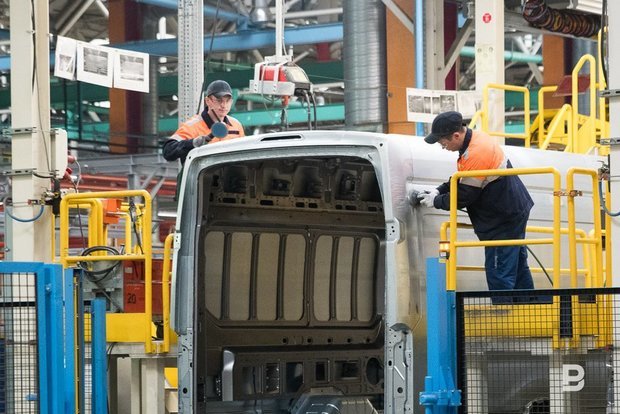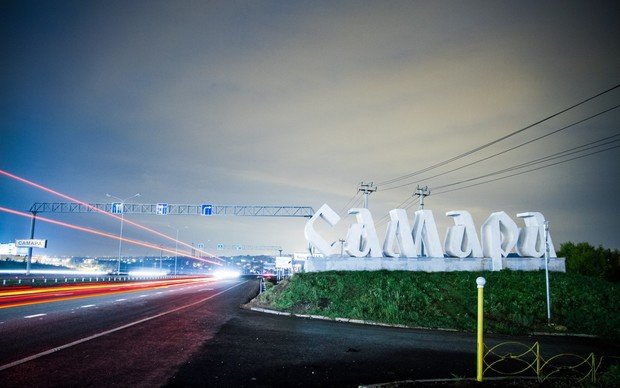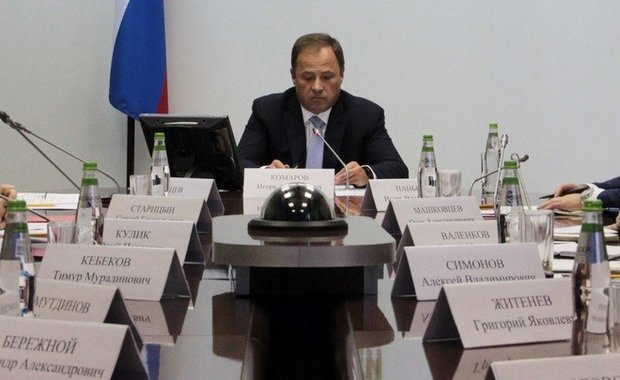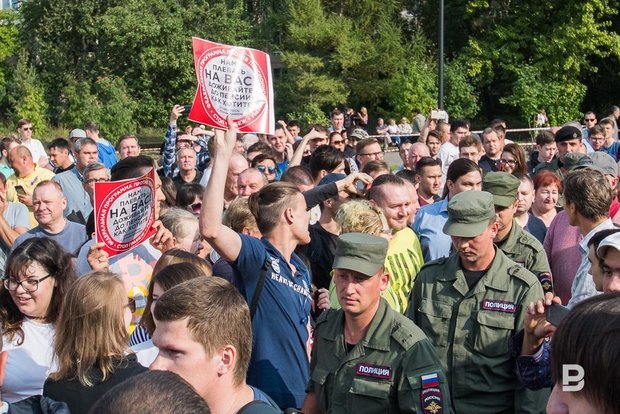''The task of creating a Russian super-region in the Volga Federal District seems to me very topical''
Political strategist Lev Pavlyuchkov: how to enlarge Russian regions and why Tatarstan should be left alone
The initiative of the Russian Ministry of Economic Development to create 14 economic macro-regions is timely, as we have different quality of management in regions, thinks political strategist Lev Pavlyuchkov. In an interview with the Realnoe Vremya, the expert explains why the Volga Federal District should be a test site for it, what a choice of the protest behaviour of citizens the Kremlin's domestic policy pushed to and why the pension reform's authors should have looked closer at the ''corpse's age''.
''It would be a big mistake to dissolve Tatarstan in underdeveloped Russian regions of the Volga Federal District''
Mr Pavlyuchkov, why is the issue of enlargement of Russian territories into ''macro-regions'' for economic reasons becoming topical again?
I personally talked with Governor of Ulyanovsk Oblast Sergey Morozov and Governor of Samara Oblast Dmitry Azarov that it was necessary to create a united economic macro-territory. Firstly, it will allow to offer potential investors a completely different assortment of specialised conditions. There will be a wonderful opportunity to unite themes into big clusters. In other words, for instance, air space got lost. But it completely suits the same interregional cluster system, which Samara and Ulyanovsk Oblasts can offer to each other today. On the one hand, there are 3,5 million citizens. On the other hand, there are 1 million residents. At the same time, they are identical regions. Ulyanovsk Oblast has a wonderful investment reputation, experience in the attraction of investors, same Tatarstan, Kaluga. Samara Oblast offers a wide range of opportunities in gas chemistry, production of fertilisers, mineral extraction, mechanical engineering. Both regions have automobile clusters, UAZ, AvtoVAZ. Consequently, there is an opportunity to manufacture spare parts. In other words, KAMAZ enters the site of UAZ in Dimitrovgrad, big companies like MIR enter the technology park in Tolyatti. There is an opportunity to make the Ulyanovsk-Samara site a big production cluster for the automotive industry, to manufacture spare parts, develop metalworking.
Moreover, there is a frank leaning in the region now – Tatarstan's GDP is as big as that of all other Volga Federal District's regions together. It's as strange as the fact that Moscow generates 39% of the country's GDP. It's wrong, Moscow is overpopulated, and the territory doesn't develop. The possibility of creating a Russian super-region of the Volga Federal District, a new macroeconomic zone seems to me very topical.

''There is a frank leaning in the region now – Tatarstan's GDP is as big as all other Volga Federal District's regions together. It's as strange as the fact that Moscow generates 39% of the country's GDP. It's wrong.'' Photo: Maksim Platonov
You're talking about a united macroeconomic zone, which will come from a merge of Ulyanovsk and Samara. Does it mean that you disagree with the model forecasted once by @Metodichka Telegram channel where Tatarstan will become a leader of some enlarged region in the Volga region and in exchange for this role the republic will refuse the ''expressed national ideology''?
No, it won't, of course. To make Samara similar to Tatarstan, all Tatars need to be relocated to Samara because it's a Turkic qualitative nature of interpersonal relations, professional relations, high responsibility inside social groups, which is based on family, religious, clan principles. It would be a big mistake to dissolve Tatarstan in underdeveloped Russian regions of the Volga Federal District. It shouldn't be done when there is an opportunity to create an analogous Samara-Ulyanovsk macro-region.
By the way, this issue was raised in 2003 when Ulyanovsk Oblast with a budget of 12 billion, which has 57 billion now, I want to remind you, was the weakest region of the country. The problem is that it's complicated to unite this region with Samara where Samara is a favourite after Morozov, who raised Ulyanovsk Oblast from the bottom. Administrative division can be saved. But there is an issue of creating a united economic zone.
I offered this to both governors as a corporation of interregional development and creation of conurbation. It would be the only conurbation in the Russian Federation – Syzran, Ulyanovsk, Dimitrovgrad, Samara, Tolyatti. And in this conurbation, we would get an urban population, consequently, service market, labour market, the market of opportunities, the consumer market for some 2,5 million people. It would be cool, this is the way we should develop. Cities located almost 200 km from each other need to be connected with high-speed advanced transport networks, so that these cities would have equal living conditions. Today people are migrating from Tolyatti to Samara. I sell big realty in Samara, and 15% of purchasers are always citizens of Tolyatti because Tolyatti is dying. It's impossible to find a job, 110,000 people used to work at AvtoVAZ, now they are 30,000, and there will be less. The union of regions in inevitable.

''Today people are migrating from Tolyatti to Samara. I sell big realty in Samara, and 15% of purchasers are always citizens of Tolyatti because Tolyatti is dying.'' Photo: culture.ru
Does it mean the initiative of the Russian Ministry of Economic Development is timely?
I think so. The first talks about this appeared in the 90s, Zhirinovsky raised them. Then it was said about the creation of 33 regions, but now it's being said about the creation of 14 economic macro-regions. It's a bit different. But it's close anyway. What's wrong here? We have a very different quality of management of regions. What we see today is that Ulyanovsk Oblast has reached the peak of its development. That's it. New steps are needed further. This is why regions have both a political and staffing crisis and further reduction of the level of corporate management.
''Private business elites ran out, and it's a big problem''
We can conclude from what you've said that the Volga Federal District is to be the test site of the reform to enlarge regions. Why?
I will say to you this way: there is a region that completely copies Russia, it's Samara. Samara Oblast is the country. The logic of Samara Oblast's position is that what happens today in Samara will happen tomorrow in Russia because it's the region where all ethnicities are represented, the transport situation is very close, there is a whole range – from extraction to production, from high technologies to agrarian. And, in general, the Volga Federal District is very diverse in itself, from Kirov Oblast, which is in the north of Russia, to southern Saratovsky Kust. This is why it would be feasible to do experiments here, you can't make it worse.
For instance, Saratov Oblast fails in everything, it's the bottom. This region has touched the bottom. Kiriyenko knows it, Putin, Medvedev know it – everyone knows it. People escape from there. There is no water in regional centres for weeks. If people don't write about it, it doesn't mean it doesn't exist. The situation is very bad there. It would be logical to merge Saratov and Samara, together with Ulyanovsk, by the way. It would be possible to make a fantastically powerful region – 7 million people. And we already see an interesting construction. And, for instance, Valery Radayev or Morozov, who has been chairing his region for 14 years, will be the ruler of this construction. But the world has gone far ahead for 14 years. Private spacecraft already travel in space, while a person still works as a governor. This can't go on in our world. If we want to catch up with the USA or another country, we must be faster. The president says, on the one hand: ''Let's create Sirius (Editor's Note: an educational centre in Sochi) where we will gather gifted children''. On the other hand, he re-appoints people who have been working for 20 years as governors. I don't understand the logic.
Is it logical to conclude that this is why the institute of plenipotentiary ambassadors finds a new lease of life, though it was already predicted a sunset?
I wouldn't say so. The institution of plenipotentiary ambassadors is ridiculous because the appointed governors are already de-facto the president's plenipotentiary ambassadors. Igor Komarov has been appointed as the plenipotentiary ambassador in the Volga Federal District now. For instance, this means he will be responsible for sectors designed to create macro-quarters, the union of groups of Ulyanovsk, Samara and other companies in the best interests of Rostec. In other words, it's the zone with the highest concentration of Rostec enterprises. Roman Antonov becomes the political manager (Editor's Note: it's been recently said former Vice Governor of Nizhny Novgorod Oblast Roman Antonov would occupy the post of one of Igor Komarov's deputies), a strong participant of political processes. I don't know and I don't understand how he will work, what his task is. He's such an energetic person that will face the same strong and opposite groups of influence in the regions like he did in Oryol and Nizhny Novgorod.

''The institution of plenipotentiary ambassadors is ridiculous because the appointed governors are already de-facto the president's plenipotentiary ambassadors. Igor Komarov has been appointed as the plenipotentiary ambassador in the Volga Federal District now. For instance, this means he will be responsible for sectors designed to create macro-quarters, the union of groups of Ulyanovsk, Samara and other companies in the best interests of Rostec.'' Photo: pfo.gov.ru
Speaking about big enterprises, I'd like to note that the economic enlargement of regions will, first of all, affect the situation of business elites on these territories, with their habitual interests, plans, access to orders and so on. How will these contradictions be resolved?
Unfortunately, there is almost no business elite in the country. Big private companies, like Yukos or SOK Group of Companies, thank God, today's Alfa-Group, compete with the state. These people have always bought the best political strategists, journalists, designers, bankers. In other words, the best staff entered private, highly competitive businesses.
For instance, is Vladimir Avetisyan, ex-director of Volgopromgaz who's working as Chubais's deputy now, a business elite in Samara? No. He lost Gazbank, and there are criminal cases on this bank now. What a business elite is he then? He's a business loser. As a maximum, he's an employee of Rosnano state corporation, and that's it. There is no elite. This is why it's rubbish that some elites will be against. Elites ran out, and it's a big problem.
''The president isn't aware of the average salary in the country''
Is it correct that the protest on the all-Russian anti-pension reform protest campaign held in Samara on 2 September by Civil Initiative movement and deputy Mikhail Matveyev, which gathered from 7 to 10,000 people according to the protestors themselves, has been the second most populous protest campaign in Russian regions after Moscow? If so, what does it mean?
Yes. I've been working in Samara for many years. The specifics here is very interesting – processes with different meanings but identical in terms of their scale can take place in Samara at the same time. This means there is loyalty to power in Samara Oblast and Samara, which is linked with the WC, with the fact that Azarov is an understandable, interesting and clear candidate for the locals who was expected and whom they got because they tired of Merkushkin. This is why Azarov's high approval is really expected. On the other hand, the protest level is high because Samara has always had strong protest moods. It's a territory with processes affecting the whole country. Once I held an election campaign against Mayor Limansky who was simultaneously supported by Putin and Luzhkov. They were on banners together with Limansky. And he lost the election – this is Samara. I held an election campaign against the Greens in Samara, and this party was elected to the parliament in 2007. Can this party be elected to the parliament now? I'd actually say it's a matter of money and desire. December movement (Editor's Note: a public movement in Tolyatti) in Samara Oblast brought a Baptist mayor (Editor's Note: Sergey Andreyev) from Civil Platform to power on the President Election Day in 2012. Who are the people from December movement? Where do they come from? So Samara Oblast has very big potential for protest. This is why I say: Samara is Russia. What has happened in Samara today will happen in Russia tomorrow.

''We're talking about the real reduction of the real indicator, the ''corpse's age'', which is very classified. An average lifespan is a lie. People feel it when they lay 40-, 50-, 60-year-old people to rest. And they are said: ''We began to live longer.'' Photo: Maksim Platonov
Can we say after the outdoor campaigns on 9 September that it's a kind of life-changing moment in citizens' behaviour and that outdoor activity will augment further?
We've never been in the situation we are in now. We can't presuppose what this situation will bring to because it's happened to us for the first time.
I think the situation is quite dangerous because people have two plans for protest, and they understood it. The Kremlin's domestic policy is so lazy and ugly that they made people choose: to either protest by participating in protests and getting their heads clubbed or protest calmly by voting for any candidate except the candidate from power's party. People did it massively.
I don't know how this protest will develop further. But I do know the candidates that went through to the second round of governor election from different parties like LDPR or CPRF are the people who won't be able to fulfil a governor's obligations in case of victory. It's spoilers that stopped being so when the pension reform took place, which is a huge mistake. The president's speech was the apogee, which should have happened earlier and more clearly or after the election, leaving people hope for a fair decision.
We're talking about the real reduction of the real indicator, the ''corpse's age'', which is very classified. An average lifespan is a lie. People feel it when they lay 40-, 50-, 60-year-old people to rest. And they are said: ''We began to live longer.'' It's Skvortsova who is far from real problems says it.
The president isn't aware of the average salary in the country. The average effective salary is 20,000 rubles. It's normal money people get outside the Moscow Automobile Ring Road. They sat at work for 8 or 12 hours and got 20-22,000 rubles. People get 10, 12,15,000 rubles in Dimitrovgrad, and it's their real salary, not an average that a manager of Rostechnologies gets – a million a month.
The full separation of operators of the domestic political bloc from the country's problems led to an incredibly complicated choice they had in front of them. The choice is: how to say to the president they failed him?